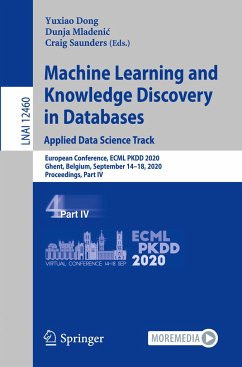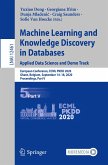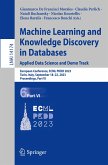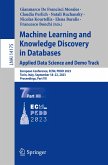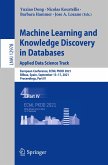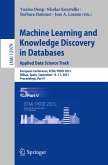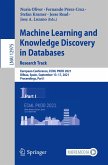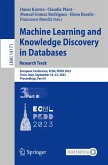The 5-volume proceedings, LNAI 12457 until 12461 constitutes the refereed proceedings of the European Conference on Machine Learning and Knowledge Discovery in Databases, ECML PKDD 2020, which was held during September 14-18, 2020. The conference was planned to take place in Ghent, Belgium, but had to change to an online format due to the COVID-19 pandemic.
The 232 full papers and 10 demo papers presented in this volume were carefully reviewed and selected for inclusion in the proceedings.
The volumes are organized in topical sections as follows:
Part I: Pattern Mining; clustering; privacy and fairness; (social) network analysis and computational social science; dimensionality reduction and autoencoders; domain adaptation; sketching, sampling, and binary projections; graphical models and causality; (spatio-) temporal data and recurrent neural networks; collaborative filtering and matrix completion.
Part II: deep learning optimization and theory;active learning; adversarial learning; federated learning; Kernel methods and online learning; partial label learning; reinforcement learning; transfer and multi-task learning; Bayesian optimization and few-shot learning.
Part III: Combinatorial optimization; large-scale optimization and differential privacy; boosting and ensemble methods; Bayesian methods; architecture of neural networks; graph neural networks; Gaussian processes; computer vision and image processing; natural language processing; bioinformatics.
Part IV: applied data science: recommendation; applied data science: anomaly detection; applied data science: Web mining; applied data science: transportation; applied data science: activity recognition; applied data science: hardware and manufacturing; applied data science: spatiotemporal data.
Part V: applied data science: social good; applied data science: healthcare; applied data science: e-commerce and finance; applied data science: computational social science; applied data science: sports; demo track.
The 232 full papers and 10 demo papers presented in this volume were carefully reviewed and selected for inclusion in the proceedings.
The volumes are organized in topical sections as follows:
Part I: Pattern Mining; clustering; privacy and fairness; (social) network analysis and computational social science; dimensionality reduction and autoencoders; domain adaptation; sketching, sampling, and binary projections; graphical models and causality; (spatio-) temporal data and recurrent neural networks; collaborative filtering and matrix completion.
Part II: deep learning optimization and theory;active learning; adversarial learning; federated learning; Kernel methods and online learning; partial label learning; reinforcement learning; transfer and multi-task learning; Bayesian optimization and few-shot learning.
Part III: Combinatorial optimization; large-scale optimization and differential privacy; boosting and ensemble methods; Bayesian methods; architecture of neural networks; graph neural networks; Gaussian processes; computer vision and image processing; natural language processing; bioinformatics.
Part IV: applied data science: recommendation; applied data science: anomaly detection; applied data science: Web mining; applied data science: transportation; applied data science: activity recognition; applied data science: hardware and manufacturing; applied data science: spatiotemporal data.
Part V: applied data science: social good; applied data science: healthcare; applied data science: e-commerce and finance; applied data science: computational social science; applied data science: sports; demo track.

